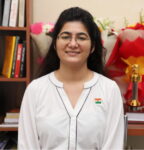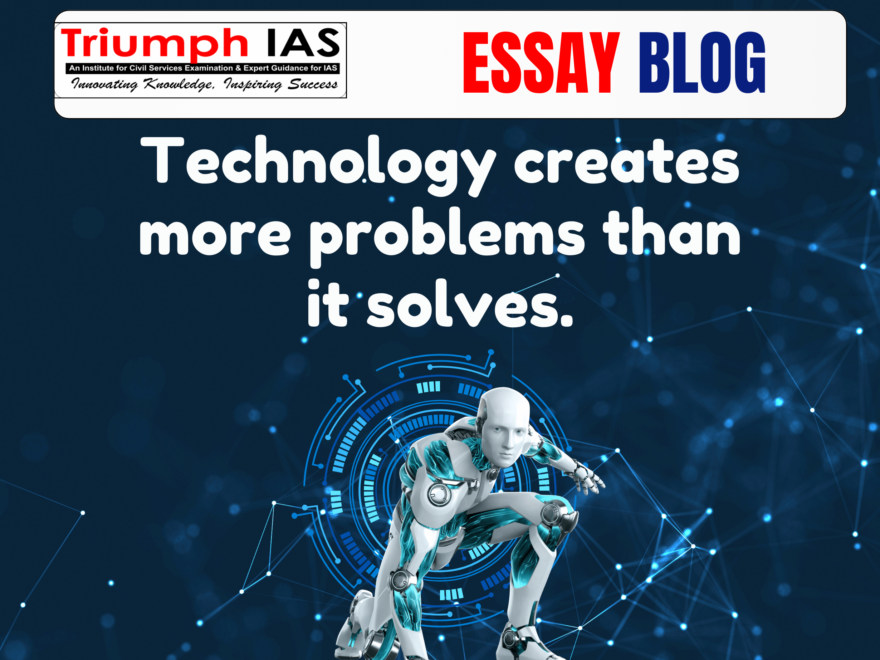IAS, DIVYA MISHRA

Essay Topic:
“Technology crater more problem than it selves”
(Relevant for Essay Writing for UPSC Civil Services Examination)
“Technology crater more problem than it selves”The 21st century owes its successes and achievements to the rapid technological advancements. Here, technology should not be confused with science. Where science deals with the ‘what’ and ‘how’ of things, technology deals with ‘getting things done’. A plenitude of technological innovations have been made that touch more or less every aspect of human life. Now the question is – whether these changes are good or are they just antecedent of new problems? As has been said: “Every problem has a solution and every solution creates new problems”. For instance, social media has indeed increased connectivity among people. People are ‘residentially disjoint but functionally joint now’, but it has also given rise to an ‘underlying trend of self-alienation’. This makes us think: has technology made our life better or worse off? Human life as always is mired in tradeoffs between alternatives. Albert Einstein believed in ‘technology for human development’. His research in atomic energy widened the horizon of research. MRI scans, X-rays are a great help in medical sciences, food irradiation increases shelf life of processed food. Yet, on the other hand, we faced nuclear disasters like Fukushima and Chernobyl. The waste disposal of nuclear plants is itself a humongous task. It shows that the threats of nuclear technology are more grave and long-term than its immediate benefits. Another advancement that humanity has made is in defense technology. We feel safe with most modern supersonic missiles (Brahmas), inter-continental ballistic missiles, submarines plying on roads, water and air. But these weapons of mass destruction do not account for collateral damage to not just innocent humans but also wildlife, forests, etc. Harmful chemicals from them leach to the underground aquifers. Our rapid inroads have now included space as well. There is a race between countries for ‘weaponization of space’. Undoubtedly, today our life is entirely dependent on equipment like Wi-Fi satellite, mobile which are run through satellite technology. Better navigation through GPS, creeps monitoring weather forecasting and disaster management has become more expedient. But humanity has not stopped here. We are aspiring for asteroid mining (e.g. Japan’s Bennu asteroid), making artificial moons (e.g. China’s mission). This may start space wars. It indicates that technology, besides solving problems, is creating new ones too. Space debris is emerging as a new challenge; running at 25,000 miles per second can damage any satellite or great advances in Biotechnology. For instance, gene editing – CRISPR – Cas9, criminal identification through DNA profiling, rare diseases, genetic diseases can be solved. But the ethical conundrums associated with these problems can’t be ignored e.g. cloning, designer babies, privacy concerns (in case of DNA data storage). This poses the larger question of whether we are solving problems or creating new ones. Benefits of Biotechnology have significantly helped farmers, especially in areas with a fine fold increase in food production. But this was accompanied by HYV seeds, pesticides, high water requirement. Now what we are facing is the challenge of nutrient pollution, loss of soil fertility, higher incidences of cancer, lower yields. This is pushing the agrarian society to demand for reservation in public jobs or it is succumbing to alcohol and drug abuse (i.e. case in Punjab). Another marked feature of this century is unprecedented advances in communication and computer technology. The whole ‘Globe is one’ now. But this oneness is at the cost of a threat on cyber security. The incidences of cyberbullying, trolling, stalking, data theft (e.g. recent Agent Smith Botnet) have increased by 30%. It not only compromises national security but also the ‘inner peace’ and denies social well-being of technology at a time of globalization ‘women’ are undoubtedly more empowered; more jobs are created in IT, ITES, BPO areas. But another fact is that 53% of the jobs have become informal as well. Violence against women has increased. Patriarchy has entered social media as well. Explosive and irresponsible social media radicalizes youth. ISIS has adopted it as a tool to increase its result of rumors on social media (Dimapur case). Children are also affected; on one hand they have access to better learning sources which are less expensive but they are also affected by targeted groups engaged in online child sexual assault, Blue whale game, PUBG. In the above section we saw the impact of technology on different sections of society, but it is also important how technology is impacting the health of society. Now we have access to generic drugs, which are more affordable, LASER-enabled cataract operations. Recently world’s first tele-robotic heart surgery was conducted in India. Defective mitochondria can be dealt with in babies now (e.g. 3-parent baby). But the recent trend of an increase in non-communicable diseases e.g. cancer, cardiovascular e.g. and multidrug resistance is posing a great threat. Not only health but also the economic opportunities have seen a dramatic shift due to technology’s intervention. Jobs are created in sectors which are ‘skill-intensive’ not ‘labor-intensive’ as reported by the ‘World Economic Forum’. This poses a challenge in front of India, which has a huge unskilled labor pool. But on a brighter side, Big data analytics, Artificial intelligence, and machine learning are changing the face of the economic reality as well. Financial inclusion due to Fin-tech solutions e.g. PayTM, UPI, JAM trinity, DBT etc. ensures more transparency and accountability in governance. Lever leakages in financial and service value chain have amounted to a saving of 40,000 crore in [2017-10]. Another dimension of technological success is in Nanotechnology. It has helped in agriculture, prevents environment degradation (through bioremediation), and averts in surgeries. However, its increased use may increase Bio-accumulation and magnification of nano substances in food chains. This could have a disastrous impact for us. Recently the BNHS – NGO reported ‘dying vultures’ who consumed Diclofenac in their bodies. Such chemicals if entered in the food chain would affect the Biodiversity of the whole planet. The impact of technology on Earth’s ecosystem is mostly seen in a negative light. However, with new advanced tools we are trying to develop sustainable solutions e.g. organic farming, micro-irrigation, rainwater harvesting, Neem-coated urea, satellite monitoring of safety of National parks and sanctuaries against poaching. Many species have been prevented from extinction with the help of shared DNA pool. We are moving towards newer cleaner and greener sources of technology e.g. solar, wind, bio-ger, biofuel, ocean-thermal energy etc. Though here as well, a recent debate on pollution by photovoltaic discarded waste, noise pollution by wind turbines has caught up. Overall, it is a mixed effect of benefits and drawbacks. There is no denying that technology does not solve anything entirely; we are evolving so is technology with us. Our needs, lifestyle is changing, so will technology. What is derivable and achievable is focus and technological solutions and innovation that guarantee sustainability. “Technology is a good servant but a bad master”. We should be mindful of this. |
To master these intricacies and fare well in the Sociology Optional Syllabus, aspiring sociologists might benefit from guidance by the Best Sociology Optional Teacher and participation in the Best Sociology Optional Coaching. These avenues provide comprehensive assistance, ensuring a solid understanding of sociology’s diverse methodologies and techniques
Meta Tags:
Water Resource Management,Water Resource Management,Water Resource Management,Water Resource Management,Water Resource Management,Water Resource Management,Water Resource Management, Water Resource Management,Water Resource Management,Water Resource Management,Water Resource Management

Why Vikash Ranjan’s foundation Classes for Essay?
Proper guidance and assistance are required to learn the skill of writing essay topics in CSE examination. VIKASH RANJAN SIR at TRIUMPH IAS guides students according to the Recent Trends of UPSC, making him the Best Essay Teacher for Essay writing UPSC.
At Triumph IAS, the Best Essay Writing Coaching platform, we not only provide the best study material and applied classes of Essay for IAS but also conduct regular assignments and class tests to assess candidates’ writing skills and understanding of the subject.
Choose The Best Essay Writing Teacher for IAS Preparation and Know our Approach for Essay?
- The Programme is Planned & Executed in a Way that You Write a good Essay for obtaining Effective Score of 140 Plus.
- In this programme we provide Classes on
- How to INTRODUCE The Topic in Context of the THEME of the Essay
- How to Elaborate & Explain the Topic-Theme on Temporal Scale & Sectoral Scale as well as Intellectual Scale in the MAIN BODY of the Essay.
- How to Sum up the Topic in CONCLUSION in Context of the Essay Topic Theme.
- ︎We will Teach You How to use the Knowledge Matrix of General Studies & Optional to write a Good Essay more Logically and Coherently.
- After the Classes You have to “Write to Learn & Learn to Score” .This means You have to Write the Essay Test Papers & Learn from the Feedback & Discussions.
Why Essay is Important and What We Offer in “Essay Test Series”?
- Triumph’s Essay Upgradation Test Series (Under Personal Guidance of Vikash Ranjan Sir) doesn’t only focus on improving student’s linguistic skills but also focus on improving student’s ability to comprehend the topic-sentence (subject) recall & relate the facts, concepts, propose thesis-statements, and logically assimilate the ideas & counter ideas with clarity in expression on temporal & Sectoral Scales of knowledge.
- Further students are provided one-on-one INTERACTION* Session with Vikash Ranjan Sir. Students get personal feedback on their strength and weaknesses, regarding what is ‘good about their essay and what more should be done to make it a better one’ by Vikash Ranjan Sir.
Why to take up this “Essay Test Series and Foundation” Course?
- Essay is Low hanging Fruit. Marks in Essay is Effectively Contributing in Final Selection in New Pattern of Mains Exam. With a Well Developed ‘Knowledge Matrix and Rigorous Practice’, One can Score upto 160 + in Essay. So IAS Aspirants should never Ignore Essay Preparation
- Inculcating Writing Competency in Essay for IAS, which is Different from Essay in English, Essay in School and College.
Follow us :
🔎 https://www.instagram.com/triumphias
🔎https://www.youtube.com/c/TriumphIAS
🔎https://t.me/VikashRanjanSociology
Find More Blogs…
| Compare and contrast Karl Marx’s and Max weber’s | Karl Marx- Historical Materialism |
| Position of Women In the Modern Indian Society | Sociology: Social system and pattern variables |
keyword: Technology crater more problem than it selves, Technology crater more problem than it selves, Technology crater more problem than it selves, Technology crater more problem than it selves, Technology crater more problem than it selves, Technology crater more problem than it selves, Technology crater more problem than it selves, Technology crater more problem than it selves, Technology crater more problem than it selves, Technology crater more problem than it selves, Technology crater more problem than it selves, Technology crater more problem than it selves, Technology crater more problem than it selves, Technology crater more problem than it selves, Technology crater more problem than it selves, Technology crater more problem than it selves,

